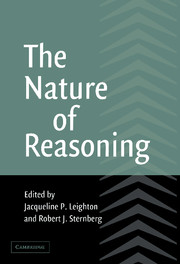Book contents
9 - Heuristics and Reasoning
Making Deduction Simple
Published online by Cambridge University Press: 05 July 2011
Summary
The term heuristic appears many times in the literatures on reasoning and decision making. For example, we have the heuristic-analytic theory (Evans, 1989), the probability heuristics model (Chater & Oaksford, 1999), judgment heuristics (Kahneman, Slovic, & Tversky, 1982) and simple heuristics that make us smart (Gigerenzer & Todd, 1999). What these theories have in common is that they suggest that people make inferences by using processes that are relatively simple to apply. Hence, people are able to make reasonably speedy and accurate decisions without recourse to lengthy and possibly computationally intractable procedures. Thus, they can avoid the need to form comprehensive and detailed representations of the world and/or consider many alternative possibilities. However, implicit in the use of the word heuristic is that it is possible to identify processes that are not heuristics, and that these have actually been proposed as models of human reasoning. However, in this chapter, I will argue that a distinction between heuristic versus nonheuristic processes is not necessarily psychologically appropriate, as the term heuristic implies an inherent degree of inaccuracy, thus ruling out similarly simple procedures that also save time and effort, but instead lead to accurate answers. Heuristics will therefore be considered as part of a wider category of short-cut procedures. Their purpose is to reduce processing load, and their use and development will be considered with respect to deductive reasoning.
- Type
- Chapter
- Information
- The Nature of Reasoning , pp. 234 - 272Publisher: Cambridge University PressPrint publication year: 2003
- 2
- Cited by



